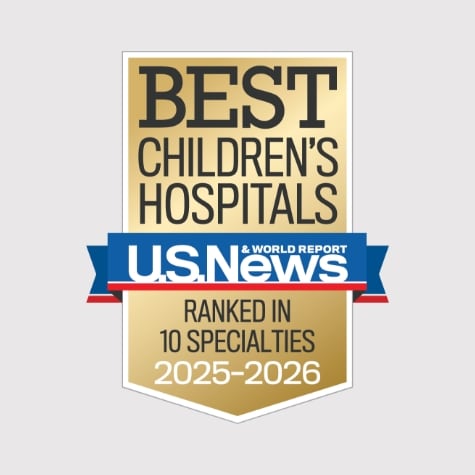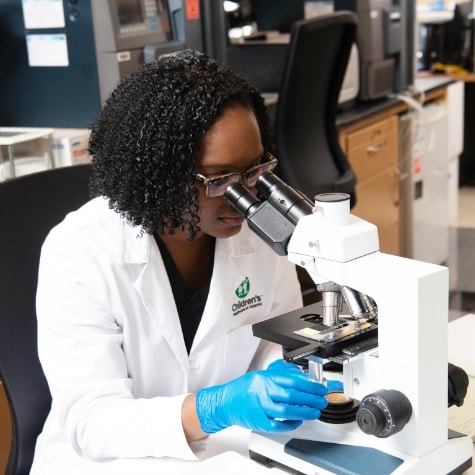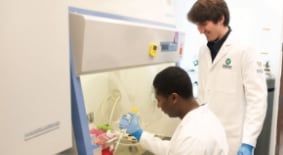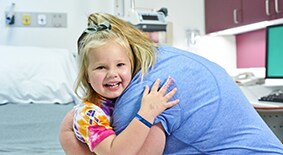
National Honors from U.S. News & World Report
Children’s ranks among the nation’s top pediatric hospitals on the U.S. News & World Report list of “Best Children’s Hospitals.” The report ranks hospitals for excellence in outcomes, program structure and national reputation in 10 pediatric specialty areas.
learn more
Emory University, Our Primary Research and Academic Partner
Children’s and Emory University School of Medicine partner together on clinical trials, residencies and fellowships. More than 500 physicians hold titles at both institutions. Our research program has ranked in the top five nationally for National Institutes of Health (NIH) funding for a decade.
Learn About EmoryWith a $550 million endowment—one of the largest investments in pediatric mental health by a healthcare system in U.S. history—and an electronic health record data architecture established for one of the nation’s first learning health systems in child mental health, Children’s aims to make Georgia a national leader in behavioral and mental health care. Established in 2019, this initiative is focused on expansive, integrated clinical and research programs in the care of more than 8,000 new patients annually through the Children’s Zalik Behavioral and Mental Health Center.
The Zalik Center is dedicated to efforts to confront the increasing number of behavioral and mental health issues affecting children and adolescents using evidence-based interventions to help stem a serious youth mental health crisis. The program has already seen a nearly 40% decrease in visits to our Emergency Departments for recurrent behavioral crises among children and adolescents receiving comprehensive mental health care in the outpatient program, including those recovering from a suicidal crisis. It is heavily based in research with collaborations at Emory University, Georgia Tech and other institutions.
As part of the program’s research collaboration with Georgia Tech, John N. Costantino, MD, Chief, Behavioral and Mental Health and Liz and Frank Blake Chair for Children's Behavioral and Mental Health, is co-lead of Patient-Centered Care and Delivery for the Children’s Healthcare of Atlanta Pediatric Technology Center at Georgia Tech (PTC) alongside Munmun De Choudhury, PhD, Associate Professor at the School of Interactive Computing at Georgia Tech. The PTC brings clinical specialists together with Georgia Tech scientists and engineers to develop technological solutions to problems in the health and care of children. The center provides extraordinary opportunities for interdisciplinary collaboration in pediatrics, creating breakthrough discoveries that often can only be found at the intersection of multiple disciplines.
For those interested in training in behavioral and mental health at Children’s and Emory, read about our Doctoral Internship in Health Service Psychology.
Discovery efforts surround our focus on the delivery and improvement of preventive intervention and treatment services to diverse populations of children and teens at risk for enduring mental health conditions. The research team is comprised of scientists representing the disciplines of pediatrics, psychiatry and behavioral sciences, public health, epidemiology, genetics and implementation science, including faculty within the academic Division of Behavioral and Mental Health and the larger scientific community of Emory University. Our team also includes collaborators outside of Children’s who are national leaders in innovations for higher-impact intervention in child mental health. We work closely with informaticists at Children’s to rigorously monitor the impact of clinical transformation efforts undertaken by our system in response to the youth mental health crisis in Georgia and throughout the U.S.
Leadership
- John Constantino, MD, Chief, Behavioral and Mental Health
Team
- Daria Beinenson, MS, Behavioral and Mental Health Outreach Coordinator
- Nikolay Braykov, MS, Advanced Analytics and Outcomes Manager | PubMed Publications
- William (Bill) H. Copeland, PhD, Professor, University of Vermont | PubMed Publications
- Janet Cummings, PhD, Professor, Emory University | Emory Profile | PubMed Publications
- Katie Daniel, DNP, Advance Practice Provider Educator – Psychiatric Mental Health
- Munmun De Choudhury, PhD, Associate Professor, Georgia Institute of Technology | Georgia Tech Profile | PubMed Publications
- Laura Dilly, PhD, Psychologist and Assistant Professor, Emory University | Emory Profile | PubMed Publications
- Hillary Henderson, Behavioral and Mental Health Analytics Program Manager
- Jim Hudziak, MD, Emeritus Professor, University of Vermont | PubMed Publications
- Jackie Joyce, Research Assistant | PubMed Publications
- Belise Livingston-Burns, MD, MPH, Medical Director, Hughes Spalding Primary Care Clinic, and Assistant Professor, Emory University | Emory Profile
- Alison LoPilato, PhD, Assistant Professor, Emory University | Emory Profile | PubMed Publications
- Kayla Mays, DNP, Advanced Practice Psychiatric Mental Health Manager
- Phoebe McCutchan, PhD, MPH | PubMed Publications
- Laura Jane Miller, MD, Psychiatrist, Emory University | PubMed Publications
- Gargi Mukherjee, MD, Hospitalist and Assistant Professor, Emory University | Emory Profile | PubMed Publications
- Bonney Reed, PhD, Psychologist and Associate Professor, Emory University | Emory Profile | PubMed Publications
- Lisa Schneider, MS, Director, Behavioral and Mental Health Hospital Operations | PubMed Publications
Our Program by the Numbers

Clinical Trials
Children’s is involved in more than 1,200 clinical trials locally, nationally and abroad. Find or join one of our trials. Narrow your search by including a specific condition or disease.
Find Our Trials
Parameterizing Toxic Stress in Early Childhood: Maternal Depression, Maltreatment, and HPA-Axis Variation in a Pilot Intervention Study, Wagner RE, Jonson-Reid M, Drake B, Kohl PL, Pons L, Zhang Y, Fitzgerald RT, Laudenslager ML, Constantino JN. Prev Sci. 2025 Mar.
Reducing Abuse and Neglect Recurrence Among Young Foster Children Reunified With Their Families, Constantino JN, Buchanan G, Tandon M, Bader C, Jonson-Reid M. Pediatrics. 2023 Sep 1.
An Architecture for Transformation in Child Mental Health, Constantino JN, Dilly LJ. JAMA Psychiatry. 2024 Dec 1.
Bridging the Divide Between Health and Mental Health: New Opportunity for Parity in Childhood, Constantino JN. J Am Acad Child Adolesc Psychiatry. 2023 Nov.
Prospects for Leveling the Playing Field for Black Children With Autism, Constantino JN, Abbacchi AM, May BK, Klaiman C, Zhang Y, Lowe JK, Marrus N, Klin A, Geschwind DH.J Am Acad Child Adolesc Psychiatry. 2023 Sep.
Causation, trait correlation, and translation: Developmental brain imaging in research on neuropsychiatric conditions of childhood, Constantino JN, Constantino-Pettit AM. Dev Cogn Neurosci. 2025 Apr.
Mapping neural correlates of biological motion perception in autistic children using high-density diffuse optical tomography, Yang D, Svoboda AM, George TG, Mansfield PK, Wheelock MD, Schroeder ML, Rafferty SM, Sherafati A, Tripathy K, Burns-Yocum T, Forsen E, Pruett JR, Marrus NM, Culver JP, Constantino JN, Eggebrecht AT. Mol Autism. 2024 Aug 22.
Mate selection and current trends in the prevalence of autism, Forsen E, Marrus N, Joyce J, Zhang Y, Constantino JN. Mol Autism. 2024 Jul 16.
A MYT1L syndrome mouse model recapitulates patient phenotypes and reveals altered brain development due to disrupted neuronal maturation, Chen J, Lambo ME, Ge X, Dearborn JT, Liu Y, McCullough KB, Swift RG, Tabachnick DR, Tian L, Noguchi K, Garbow JR, Constantino JN, Gabel HW, Hengen KB, Maloney SE, Dougherty JD.Neuron. 2024 Jul 3.
Clinical variants paired with phenotype: A rich resource for brain gene curation, Chopra M, Savatt JM, Bingaman TI, Good ME, Morgan A, Cooney C, Rossel AM, VanHoute B, Cordova I, Mahida S, Lanzotti V, Baldridge D, Gurnett CA, Piven J, Hazlett H, Pomeroy SL, Sahin M, Payne PRO, Riggs ER, Constantino JN; Brain Gene Registry Consortium. Genet Med. 2024 Mar.
Examining Sex Differences in Autism Heritability, Sandin S, Yip BHK, Yin W, Weiss LA, Dougherty JD, Fass S, Constantino JN, Hailin Z, Turner TN, Marrus N, Gutmann DH, Sanders SJ, Christoffersson B. JAMA Psychiatry. 2024 Jul 1.
Independent Contributions of Callous-Unemotional Behaviors and Quantitative Autistic Traits to Aggression in Early Childhood, Lineback K, Baer HC, Zhang Y, Hartenbach D, Mills-Koonce WR, Willoughby MT, Glowinski AL, Constantino JN, Marrus N. JAACAP Open. 2023 Dec 26.
“Tracking Population Health, Care Plan, and Unmet Needs Data for Pediatric Behavioral Health Patients,” Kayla Mays and Katherine Daniel, 2025 Annual Southeastern Pediatric Research Conference, June 6, 2025, Atlanta, GA.
“Tracking Episodes of Care and Unmet Needs for Behavioural Health Patients,” Katherine Daniel and Kayla Mays, American Medical Informatics Association 2025 Clinical Informatics Conference, May 22, 2025, Anaheim, CA.
“From Recognition to Management,” Katherine Daniel, Children’s Healthcare of Atlanta Advanced Practice Provider Autism Grand Rounds, April 17, 2025, Atlanta, GA.
Development and Replication of Objective Measurements of Social Visual Engagement to Aid in Early Diagnosis and Assessment of Autism. Jones W, Klaiman C, Richardson S, Lambha M, Reid M, Hamner T, Beacham C, Lewis P, Paredes J, Edwards L, Marrus N, Constantino JN, Shultz S, Klin A. JAMA Netw Open. 2023 Sep 5.
Infant viewing of social scenes is under genetic control and is atypical in autism. Constantino JN, Kennon-McGill S, Weichselbaum C, Marrus N, Haider A, Glowinski AL, Gillespie S, Klaiman C, Klin A, Jones W.Nature. 2017 Jul 20.
Autism-Related Variation in Reciprocal Social Behavior: A Longitudinal Study. Wagner RE, Zhang Y, Gray T, Abbacchi A, Cormier D, Todorov A, Constantino JN. Child Dev. 2019 Mar.
Clinical and Translational Implications of an Emerging Developmental Substructure for Autism. Constantino JN, Charman T, Jones EJH.Annu Rev Clin Psychol. 2021 May 7.

Physician/PhD Careers with Children's
There’s never been a better time to be at Children’s. We’re growing to help ensure we can provide advanced pediatric care—not just today, but for generations to come.
learn more











